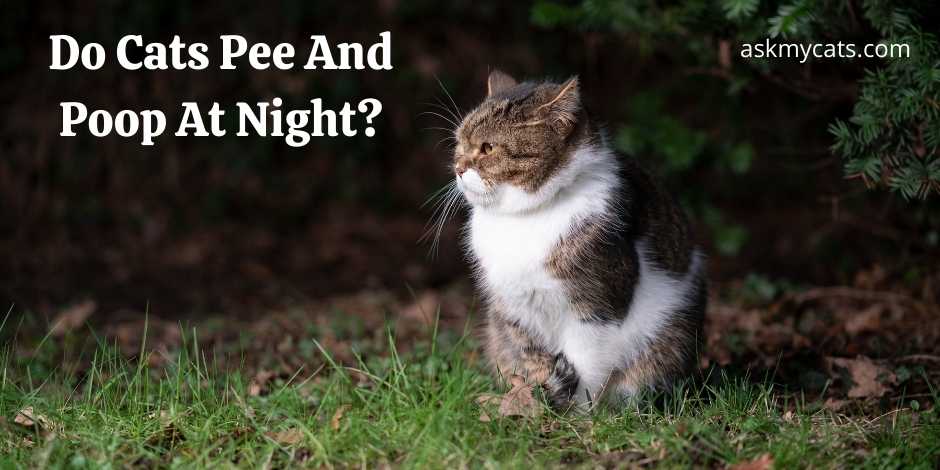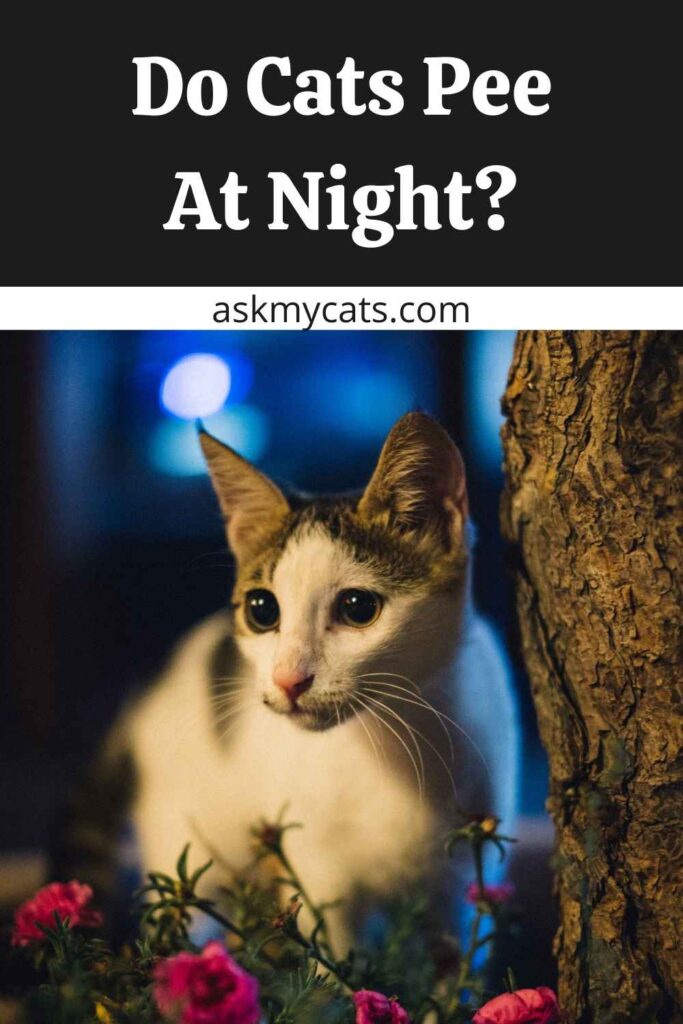Cats, unlike dogs, can keep their pee and defecate for an excessive amount of time. However, this does not imply that you should have them keep it for an extended period.
Even if you’re away, make sure your cat has access to a litter box. Most cats will not use a filthy litter box, leading to health issues.
Cats do not pee and poop at night because cats can hold it in and go for 1-2 days without pooping.
Cats can contain their bowels for an extended period. She’ll wake you up and ask to be let out if she has to use the litter box. This solution works perfectly as long as you’re prepared to wake up to open the door in the middle of the night.


Give Your Cat the Perfect Day
Get the Free Ebook!
Do Cats Poop At Night?
A cat doesn’t need to poop at night because it can hold its poop for a long time. But If your cat starts to poop at night you should look out for the reasons behind it.

Cats poop close to the litter box or on your bed in many situations due to behavioral changes.
For instance, if you have changed their living environment or made any alterations to their home, this might be a contributing factor.
Furthermore, if there are any new family members in the house, cats may be aroused. As a result, you must always make sure that no major modifications are made.
Another big factor contributing to this behavior is the sort of litter box you’re using. There might be various issues, including odor, location, filter type, and cleanliness.
Furthermore, cleaning the litter box every 4 to 5 hours is essential for your cat’s health.
Cats are quite picky animals; therefore, if they detect anything unusual about the litter box, they will refuse to use it. As a result, sanitation, hygiene, and correct material and filter usage must constantly be maintained.
Older cats may suffer from severe or mild joint discomfort, preventing them from entering the litter box in the proper position. As a result, they find it difficult to urinate or defecate in the designated areas, resulting in spillage.
It’s conceivable that your cat’s gastrointestinal problems are causing this behavior. Diarrhea and constipation are the most common causes of your cat’s inability to pee outside the litter box.
Separation anxiety might also drive your cat to defecate in unusual locations around the house. If something unusual happens near the litter box, your cat may begin to avoid it. Furthermore, dealing with it might be a challenging task.
As a result, you must continually attend to your cat’s requirements and make every effort to keep your cat happy.
You might also like to read reasons for cat will pee but not poop in litter box
Do Cats Poop More At Night?
Cats generally don’t poop at night. However, if your cat is pooping more at night, he might face some issues with his health.

Since various conditions might cause a cat to urinate on the bed, getting a clean bill of health from your veterinarian is the first step toward behavior modification.
Irritable bowel syndrome (IBS), cancer, and even intestinal parasites might cause a cat to look for a new spot to defecate. Cats often link the litter box with pain due to the suffering they experience from these illnesses. Therefore, they avoid using it.
When a cat becomes unwell, it will automatically eliminate elsewhere to protect the sickness from spreading to other cats in the colony. However, it is crucial to remember that all cats in a multi-cat household have their litter box to use.
Cats are extremely sensitive to changes in their surroundings, and they can express their dissatisfaction in a variety of strange and unpleasant ways.
After one of their pet owners returned from a business trip, it was discovered that a cat defecates improperly outside the litter box. This cat was informing them that their absence was felt strongly and not appreciated!
Although the concerns sometimes go hand-in-hand, stress or insecurity differs differently from routine and environmental changes.
Cats can be picky about the details of their litter and litter box, so it may take some trial and error to figure out precisely what your cat likes. Here are key litter components to keep in mind for all pet parents:
The sort of litter you choose can significantly impact your cat’s health. Large bulky chunks with sharp edges can injure fragile toes; thus, soft, sandy litter is normally recommended. It’s not only gentle on paws and low-tracking, but it’s also light and easy to handle and scoop.
Some cats prefer the open area of a non-lidded box or pan, while others prefer the hooded or top-entry litter box. You should also select an appropriate box for your cat’s size.
A kitten or a tiny breed of cat may be able to get by with a little litter box, but bigger cats, such as Ragdolls or Maine Coons, may require a lot more space. If your cat’s back end hangs over the edge of the litter box when they’re standing inside, you’ll need to increase the box’s size.
The location of your cat’s litter box is nearly as crucial as the box and litter. Placing the litter box or boxes in a high-traffic area of your home with little privacy will almost certainly result in a problem.
Your best chance for box location is a calm spot that is easily accessible to your cat, with no obstructions limiting easy entry or escape.
Also, read the possible reasons for cat peeing over edge of litter box
Can Cats Poop While Sleeping?
Cats do not poop when they sleep.
Cats are tidy creatures. Unless you’re talking about a sick or abused cat kept in a small cage with no separate litter box for days on end, they don’t defecate where they sleep and groom themselves every day.
Do Cats Pee At Night?
A cat can go up to 48 hours without peeing. Thus, they can hold their urine overnight. Most cats can keep their pee for 24-48 hours, and they have no trouble retaining their urine overnight.

We can’t even begin to compete with their bladder hold, even though their bodies are far smaller than ours.
But don’t use this as an excuse not to have a litter box in your home! Indoor cats should have access to their litter box at all times.
Cats that haven’t peed in over 48 hours are in danger. They may perish due to the toxins that build up inside them when they retain their urine.
Your cat will die if it is unable to pee in 72 hours.
If you’re taking your cat on a trip, make sure they get out every 6 hours to relieve themselves.
Please bear in mind your cat’s urination habits and how stressful traveling is for them. The majority of cats despise traveling.
If you’re not sure whether your cat will pee and want to ensure they don’t make a mess, put some absorbent padding in their carrier.
A cat can go without peeing for 72 hours; anything more than that could prove to be extremely dangerous for her.
The bladder of a cat is continually active. However, if a cat retains pee for more than 48–72 hours, the toxins will pile up, putting it at risk of damage or death.
If your cat hasn’t peed in a long time for no obvious reason, be cautious. Cats are excellent at concealing their discomfort.
Please visit your veterinarian if you find your cat is not peeing for longer than usual, is weeping when they urinate, is continually licking their genital areas, is missing their litter box when they pee, or if you notice blood in their pee.
Because of the structure of their urethra, male cats are more likely to have a blockage than female cats. It occurs when crystalline-like crystals or thick mucus obstruct your cat’s ability to pee. FLUTD, or Feline Lower Urinary Tract Disease, could be the cause.
Also, find out how long can a cat go without using the bathroom
Do Cats Use Litter Box At Night?
Yes, cats can use their litter box at night.
If your cat doesn’t have access to a litter box and wants to relieve himself, they will do it elsewhere. This means it’ll most likely be on a rug, carpet, or worse, and you’ll have to clean it up!
Cats are nocturnal, or crepuscular as some people refer to them, which means they are most active between the hours of dawn and twilight.
So, if your cat wants to go to the bathroom in the middle of the night and is locked in your bedroom, for example, you might not realize it.
You run the danger of waking up to find cat urine or excrement on your floor.
Their age and overall physical health mostly determine the frequency with which a cat uses the litter tray.
On the other hand, adult cats should defecate once per 24 hours and urinate 1-2 times every 24 hours as a general guideline.
This is why having at least one litter box per cat, as well as an auxiliary box, is advised.
A good rule of thumb is that the cleaner litter boxes you have, the better.
If your cat is not pooping also, you should check out this: How Long Can Cats Hold Their Poop?
To take things a step further, some owners opt for automated litter boxes, eliminating the stress of always worrying about whether or not their box is clean.
Self-cleaning automatic boxes are available. At the very least, to the point where you don’t have to scrape out the garbage every time your cat uses it.
It’s also crucial to remember that cats are clean creatures that dislike using an unclean litter box.
As a result, you’ll want that additional box handy if they’re using their boxes overnight and need to go more than once.
However, there’s no way of predicting how often your cat will use their litter box. Every cat is unique with its potty habits (some even sleep in their litter box!) It’s something you’ll learn more about as time goes on.
You might also like to read about how long can a cat go without peeing
Frequently Asked Questions
How often should a cat urinate in 24 hours?
Adult cats urinate between 2 and 4 times per day in a healthy state. Remember that this is only an average. Some healthy cats may only urinate once or twice per day.
Is my cat peeing too much?
Polyuria is when your cat urinates in larger amounts than usual. Excessive urination is usually caused by the body’s inability to control pee production. The earlier your cat is diagnosed, the better the odds of successful treatment. Make an appointment with your veterinarian right now!
Why does my cat poop on the floor every night?
Many cats have trouble coping with stress. Take a look at what’s new in your cat’s life if they’re pooping on the floor. Cats are easily agitated and do not cope well with change. Due to stress, many cats begin urinating or pooping on the floor.
Final Words
Most cats can hold their excrement for 24-48 hours and even overnight. However, this should not be used as an excuse for not having a litter box at home.
A litter box should always be available to indoor cats. Cats that haven’t peed or pooped in over 48 hours may be at risk.
Drop your questions in the comments section below.
